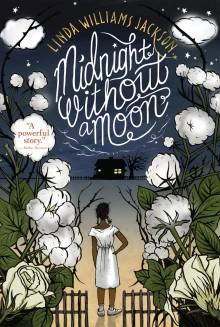
Midnight Without a Moon
Written by Linda Williams Jackson
Houghton Mifflin Harcourt, 2017, 312 pp.
ISBN: 978-0544785106
2018 Jane Addams Children's Book Award
Honor Book, Books for Older Children
In the summer of 1955, in sweltering Stillwater, Mississippi, thirteen-year-old Rosa Lee toils away at her home and in the cotton fields, doing more than her share of the work within her African-American sharecropper family. She thrives in school, where she feels valued and inspired, and even secretly entertains the idea that maybe, just maybe, she'll someday leave Mississippi and its oppression behind. She dreams of moving to Chicago to reunite with her mother and stepfather, who had joined the Great Migration north, abandoning Rosa Lee and her brother Fred to the care of their grandparents.
Rosa Lee lives in the long shadow of her grandmother, Ma Pearl, a hard woman who spares her no kindness. The abuse that Ma Pearl subjects dark-skinned Rosa Lee to is intense, and her demands seem to be endless. Her cruelty is in stark contrast to the affection that Ma Pearl lavishes on her other granddaughter, Queen, who is light-skinned and allowed to spend her days with her face in the Sears and Roebuck catalog. For Ma Pearl, skin-tone determines who will get an education and who will know freedom. At the end of summer, Ma Pearl says to Rosa Lee that it is a waste for "a strong gal like you goin' to school' 'stead o' work'n like you should be," (p. 116), dashing her hope for an education and an escape. The fairer Queen will be allowed to return to school despite her idleness and her lack of ambition.
Fortunately, Rosa Lee's best friend, Hallelujah Jenkins, a preacher's son, visits her often and infuses her with his own love for learning. Hallelujah also keeps up with the swelling Civil Rights movement and shares the news with a somewhat skeptical Rosa Lee. Ma Pearl, however, believes in knowing one's place and calls her daughter (Rosa Lee's Aunt Belle) a "dirn fool" (p.108) for working with the NAACP to help African Americans register to vote. Like Mississippi in the Jim Crow south, Ma Pearl forces her family to follow her rules, and those who dare to question her suffer harsh consequences. She embodies the ever-present prejudices and systemic discrimination that white society forced on the African-American community. Her voice is an echo of the white folks she hears while working as a maid for the Robinsons who own the land the family farms. But lest we be quick to judge, Ma Pearl's brutal and extremely disconcerting enforcement of racist positions provides the family some measure of physical and economic security.
As Rosa Lee struggles to accept her immediate future without school, a young African-American boy from Chicago visits his cousin in a nearby town and disappears. His name is Emmett Till. The gruesome facts of his murder come to light, and after the swift acquittal of the three men responsible, Rosa Lee begins to question if leaving Mississippi is truly a choice she can make. Should she leave her family and others to fight for a different Mississippi, the way her own mother left her and Fred behind? Or should she stay? Rosa Lee needs to know if she can "shine in the darkness" (p. 308) and face her choice with courage, determination, and a loving heart.
Born and raised in the Mississippi Delta, Linda Williams Jackson crafts powerful stories about everyday people in the rural south. Like Rosa Lee Carter, Jackson came of age in what she described as a "sharecropper's shack" in her remarks at the 2018 Jane Addams Children's Book Award ceremony. In Midnight Without a Moon, Jackson successfully conjures up a strong sense of place and illuminates the complexities of living under the forces of oppression. The subjugated, like Ma Pearl, can be co-opted and learn to accept and enforce a punishing ideology to procure a modicum of safety. Resisting such psychological colonization takes a strength only a few possess. Those who do, are like the stars that guide us on a dark night. Jackson's novel illustrates Jane Addams' conviction that achieving true peace means ensuring justice for people of all racial identities, gender identities, religions, abilities, classes, and cultures.
Midnight Without a Moon and its sequel, A Sky Full of Stars (2018), would complement a variety of books also set in the Jim Crow south. These include the 1977 Newbery Medal Winner, Roll of Thunder, Hear My Cry (1976) by Mildred Taylor; the Newbery Honor and Coretta Scott King Honor book, The Watson's Go to Birmingham (1995) by Christopher Paul Curtis; and Sharon Draper's New York Times bestselling and award-winning novel, Stella by Starlight (2015). For nonfiction pairings, consider the YALSA Award Winner for Excellence in Nonfiction for Young Adults in 2011, They Called Themselves the KKK: The Birth of an American Terror Group (2010) by Susan Campbell Bartoletti; and the Coretta Scott King and Printz Honor book, A Wreath for Emmett Till (2009) by Marilyn Nelson.
Tracy Randolph, St. Andrew's-Sewanee School, Sewannee, TN
WOW Review, Volume XII, Issue 2 by Worlds of Words is licensed under a Creative Commons Attribution-NonCommercial-ShareAlike 4.0 International License. Based on work at https://wowlit.org/on-line-publications/review/xii-2.












